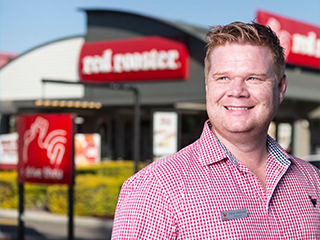
Sales and recruitment just didn’t cut it for Daniel McDouall. He started his fast food career with McDonalds while at high school before trying his hand at more corporate roles. But this Millennial knew when faced with a crossroads in his life that business ownership, and franchising, was his future.
“Fast food was something I was familiar with, I like to be hands-on. That complemented my skillset. I wanted to stick with a biggish brand. McDonald’s was pretty much closed, as were KFC, Hungry Jacks. It was a process of elimination, I spoke to a lot of franchisees, and I was really comfortable with the brand.”
He had been self-employed since the age of 22 so it didn’t even cross his mind that there was an alternative.
Signing up to the franchise was just one major life change at the time. “As we purchased our store, we had our first child three weeks after,” Daniel reveals.
However, it took a further six months to get into the store. The landlord was selling the building so there were leasing issues to settle, and legals and contract problems dragged on.
It was about 10 months before the doors opened and he could leave his previous role.
“It was daunting because there the buck stops with you. If you had HR or maintenance concerns you can go to head office. But ultimately it’s your decision and you’re paying for it.
“I wasn’t a handyman, but when a light bulb breaks you have to fix it. Some things, I ‘ll just roll up my sleeves and do it.
“If the business isn’t making money, you have to cover that. You have to get up to speed very quickly to find key drivers. But you can’t go in thinking you know it all.”
Daniel admits he made a lot of mistakes to start with because he didn’t understand the business levers.
“You can chuck a lot of labour to improve service but there’s a tipping point where you’re not making money. You learn not to throw product out for the sake of throwing out,” he points out.
But once you’ve learned the rules of the game it’s easy to replicate, he says.
“My strategy from the word go was to go big. I’m confident and back my ability.”
So when, 12 months into his business, he had the opportunity to get a second store he forged ahead.
“One of the biggest challenges to grow is to have the right people. And appreciate you need to let go in certain parts of your business, to give control to someone often a lot younger and less experienced, and have faith they have the right temperament and attitude.
“We didn’t get it right first time. You always want to hire someone similar to yourself, but they are never going to be you.”
Daniel says he quickly learned the lessons to be mindful of who you bring on board, and to value the team. He pays above award wages for a frontline manager, on award for general staff; and promotes a career path within his stores.
As the portfolio of stores has risen to seven, then dropped to five as two stores were sold to enable the purchase of bigger outlets, Daniel’s role has become a jack of all trades.
Today, with three children under the age of six he regularly works from home yet he can be found instore on a night shift four times a week.
“It’s important for the boss to be in there and hands on, and it gives me a sense of the pulse of the business and what’s going on. I’m still a strong crew person. I’ve seen it when the boss doesn’t understand how a burger is made.”
He hands responsibility for stores to restaurant managers, believing that financial transparency empowers them.
“We dive into financials with managers, not just about our margins but what the store makes, EBITDA, all the controllables, things they don’t have an effect on – royalties, rent. If I can walk away and they can run my job’s done.
“A lot of business owners try to drip feed information and expect managers to have a big impact on P&Ls.
“We’ve had to sit down if they are not doing well, and treat them as an equal. The difference is if they have more buy-in, they have more say. Full transparency makes them more responsible for the outcome.”
While he understands that some franchisees are cautious about sharing financial figures, he thinks an open approach pays off. “People think you’re making millions and driving Ferraris, and it’s not true. It’s important they understand the reality.
“We give crew examples of upselling – what impacts us and impacts our profit over a year. Then they understand why they’re doing it.
“We’re trying to make it as simple as we can. There are five key metrics: sales revenue, gross profit margin, wages percentage, average hourly rate and average ticket size.
“All restaurant managers and juniors understand those five metrics.”
If those are managed, everything else takes care of itself, he says.
Looking ahead, there could be more stores on the horizon although more stores won’t necessarily mean more money, Daniel points out.
“If we grow it will be strategically with a high-volume store. For us our first store turned over $1.5m, five stores turn over $8.2m. I’ll be happy to get to the $15m mark.”

